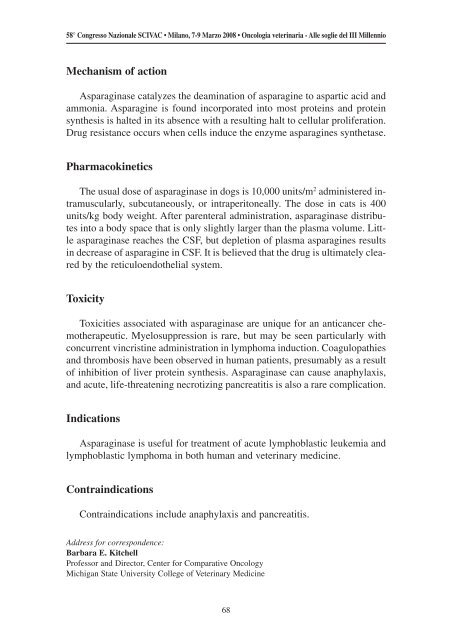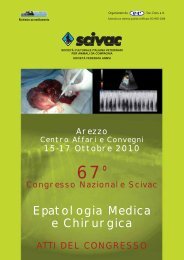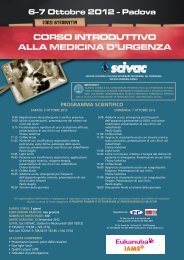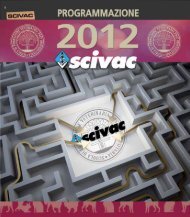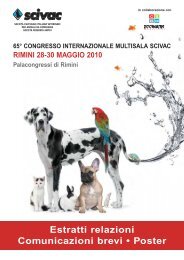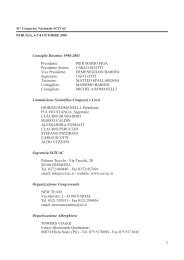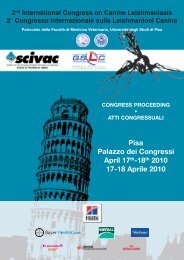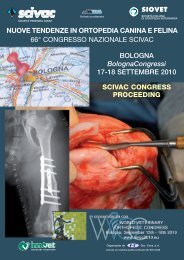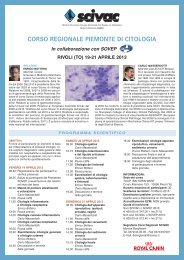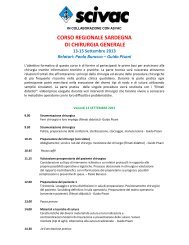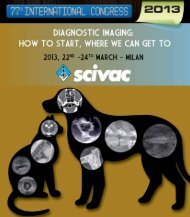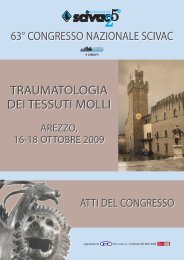58° Congresso Nazionale SCIVAC: Oncologia veterinaria
58° Congresso Nazionale SCIVAC: Oncologia veterinaria
58° Congresso Nazionale SCIVAC: Oncologia veterinaria
Create successful ePaper yourself
Turn your PDF publications into a flip-book with our unique Google optimized e-Paper software.
58° <strong>Congresso</strong> <strong>Nazionale</strong> <strong>SCIVAC</strong> • Milano, 7-9 Marzo 2008 • <strong>Oncologia</strong> <strong>veterinaria</strong> - Alle soglie del III Millennio<br />
Mechanism of action<br />
Asparaginase catalyzes the deamination of asparagine to aspartic acid and<br />
ammonia. Asparagine is found incorporated into most proteins and protein<br />
synthesis is halted in its absence with a resulting halt to cellular proliferation.<br />
Drug resistance occurs when cells induce the enzyme asparagines synthetase.<br />
Pharmacokinetics<br />
The usual dose of asparaginase in dogs is 10,000 units/m 2 administered intramuscularly,<br />
subcutaneously, or intraperitoneally. The dose in cats is 400<br />
units/kg body weight. After parenteral administration, asparaginase distributes<br />
into a body space that is only slightly larger than the plasma volume. Little<br />
asparaginase reaches the CSF, but depletion of plasma asparagines results<br />
in decrease of asparagine in CSF. It is believed that the drug is ultimately cleared<br />
by the reticuloendothelial system.<br />
Toxicity<br />
Toxicities associated with asparaginase are unique for an anticancer chemotherapeutic.<br />
Myelosuppression is rare, but may be seen particularly with<br />
concurrent vincristine administration in lymphoma induction. Coagulopathies<br />
and thrombosis have been observed in human patients, presumably as a result<br />
of inhibition of liver protein synthesis. Asparaginase can cause anaphylaxis,<br />
and acute, life-threatening necrotizing pancreatitis is also a rare complication.<br />
Indications<br />
Asparaginase is useful for treatment of acute lymphoblastic leukemia and<br />
lymphoblastic lymphoma in both human and veterinary medicine.<br />
Contraindications<br />
Contraindications include anaphylaxis and pancreatitis.<br />
Address for correspondence:<br />
Barbara E. Kitchell<br />
Professor and Director, Center for Comparative Oncology<br />
Michigan State University College of Veterinary Medicine<br />
68


